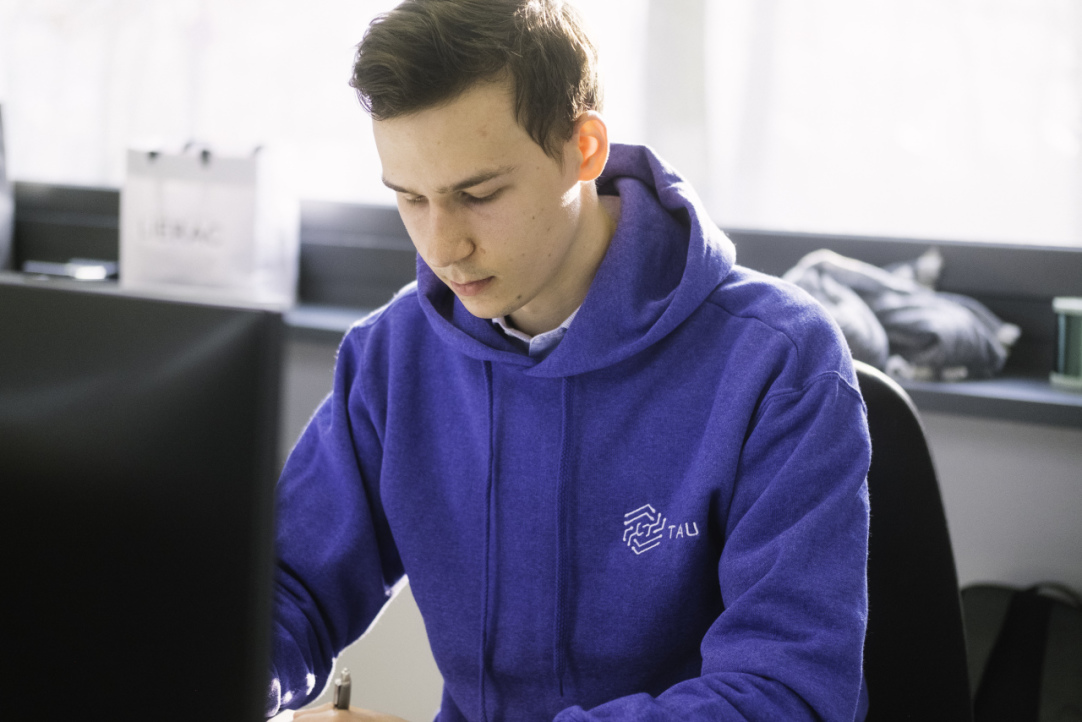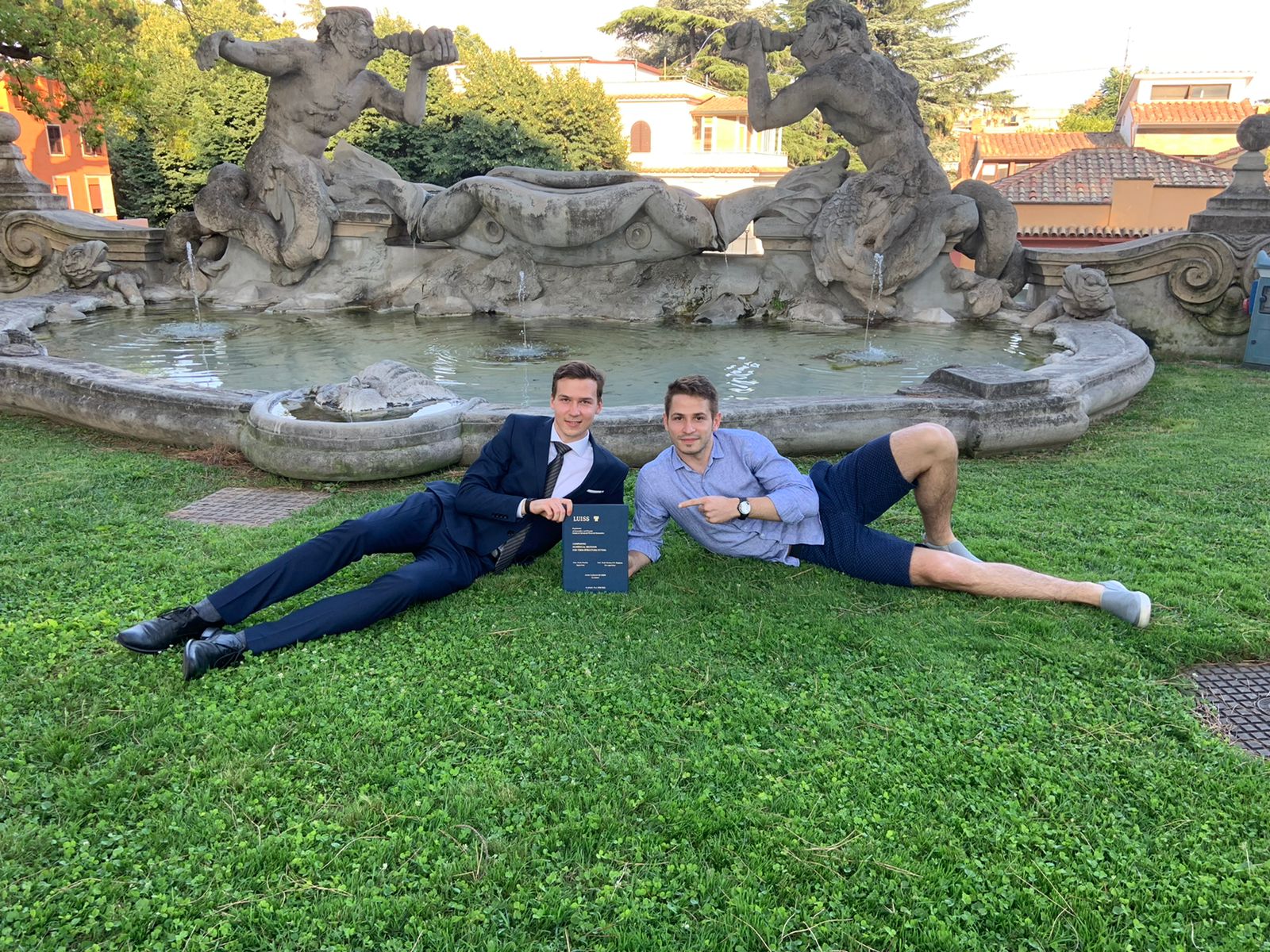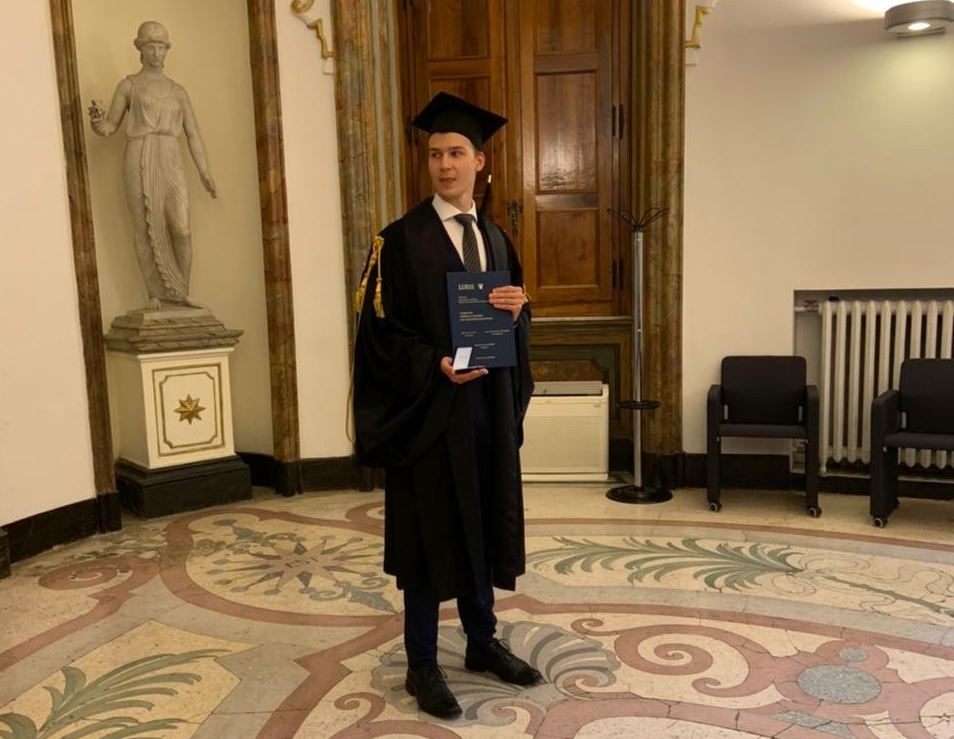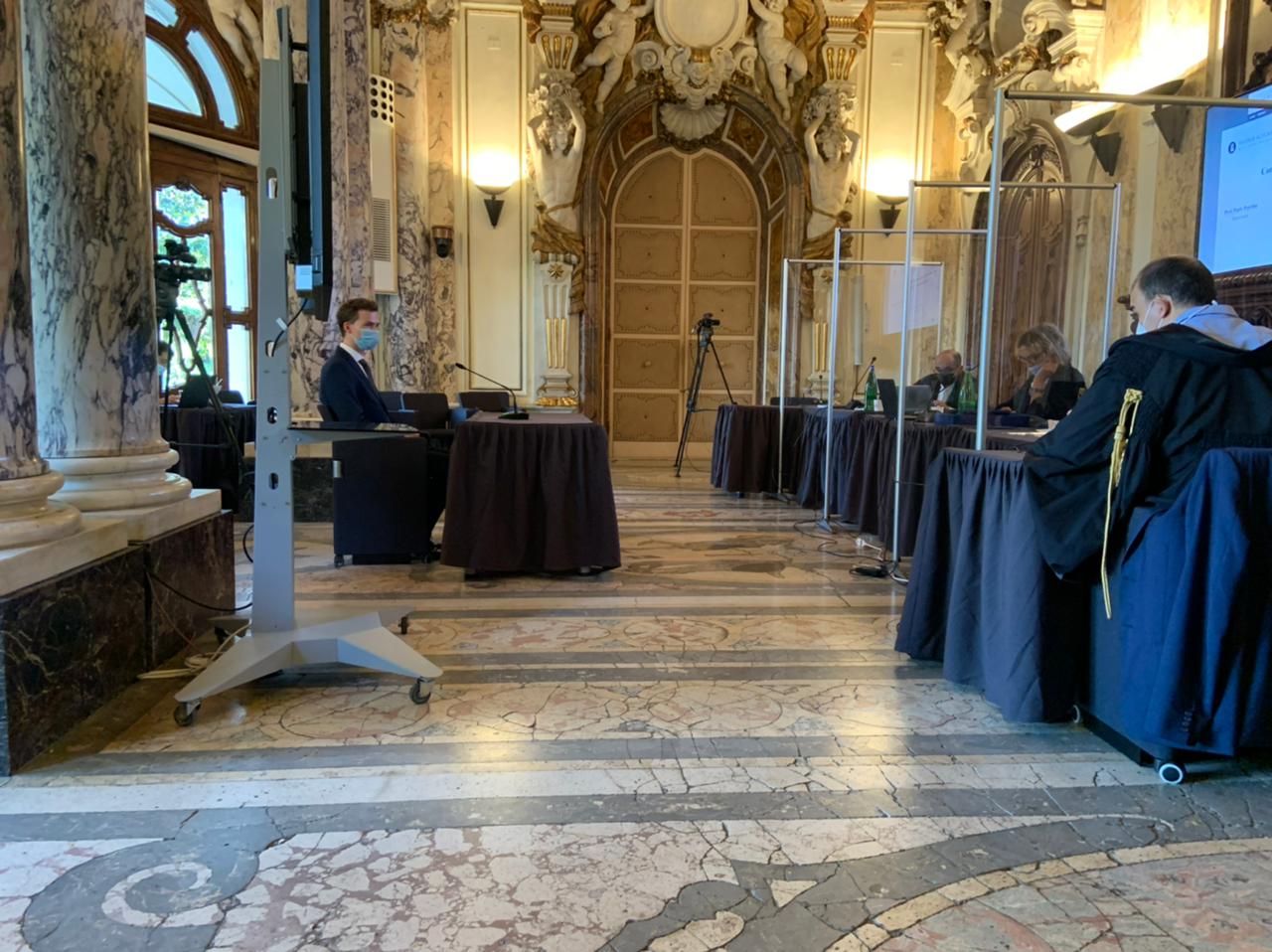"Studying at LUISS is a good test to see how committed you are"

Andrei Lukyanov enrolled in ICEF Master of Financial Economics programme in 2019. In his second year, Andrei went to LUISS University in Rome as a double degree student. Currently a financial analyst at TAU Group, the Italian-Russian engineering startup, Andrei speaks on how to prepare for the career as a quant, the opportunities that come with studying abroad, and what duties the financial experts have in e-mobility.
How to identify a promising master’s degree
In my third year, I started thinking about studying for a master’s abroad. I’d check out different career events to learn about the programmes, their cost and courses. Among my options was the USA, but the cost of the American programmes appeared a way too high. And besides, I couldn’t know for sure if the actual learning outcomes would be really worth it.
By that time, I knew I wanted to work in finance – in a bank or a financial foundation. I had my bachelor’s degree but didn’t feel I had enough experience to be a confident candidate on the job market. What I obviously needed was a master's degree with a concentration in finance, and it had to be a reputable one, if I was to get a job abroad. It wasn’t my goal to move out of Russia, actually. I love Moscow. It is one of the best cities to live and work, but I felt it was worth going for something new.

With this in mind, I turned my eyes to ICEF. I first heard about it from a friend. He studied at the faculty of economics and he said, “ICEF has a special way with economics majors.” I weighed the pros – LSE affiliated curriculum, professors from around the world, English-language programme, interview-based admission process.
To be honest, it wasn’t the best time for application plan and financial expenditures that related to studying abroad. I was busy finalizing my graduation thesis and looking for a job. I followed the path which was the easiest: I chose the programme I was most welcomed in – Maksim Nikitin made it clear to me at the interview. This is how I ended up learning Financial Economics and didn’t have to look any further.
How to prepare for the career as a quant
As a student, I was looking to fill my academic track with as much knowledge of quantitative finance as possible – I was sure I wanted to work as a quant. I believed my hard skills could land me a job in a decent fund, so I focused on finance, mathematics, programming, machine learning, econometrics, data science, i.e. courses that were meant to prepare me for a quant job in banks and funds.
As a bachelor’s student, I attended the master’s course by Viktor Lapshin, Applied Quantitative Finance, which he delivered to the economics majors. I subsequently chose this topic for my thesis.
I took Stochastic Processes by Vladimir Alexandrovich Panov, and Mathematics for Economists by Kirill Bukin. I studied derivatives and econometrics as a bachelor’s student and did every course related to data science and machine learning that was available in my master’s programme. Additionally, I took all the courses in programming languages and had thus given myself a thorough grounding in the skills needed for the job as a quant, the latter being a popular career choice among ICEF master’s graduates.
How alumni can be helpful to students
My understanding of the quantitative analyst job was shaped largely by my talks with the alumni. It was through Vladimir Malygin, the master’s alumnus of ICEF who then worked at the Dutch pension fund, Aegon, that I received a job offer from his company. I met Vladimir at a student-alumni interactive sharing session ICEF held in 2019. He was my source of information about the life in the Netherlands, employment opportunities and the functions and competencies of quants.

While I was preparing for my studies at LUISS, I contacted another ICEF master’s graduate, Anastasia Melnik. She was a student of LUISS at the time. Since finding a property to rent in Rome isn’t always that easy – and the rental rates are high – Anastasia’s help was well timed. She gave me the contact of a conscientious landlord who happened to have an apartment just a 20 minute walk from the campus. The distance was important because Rome cannot boast the best transport situation.
By the way, I even considered working in London, and there was one more ICEF alumnus who helped me with my job application folder – Anton Dashkevich. He works at Ernst & Young.
What makes LUISS an exciting place to study
As a master’s student of ICEF, I wasn’t going to miss the opportunity of studying for two degrees and go to LUISS in Rome. The LUISS-administered part of the study begins in the second year of the programme. I started preparing for the trip in the spring of 2020, but the pandemic forced me to return to St. Petersburg and go on compiling my application folder there.
That year, LUISS had five places on the programme, but I was the only student who applied. For some reason, students tend to underestimate the great opportunity available to them at ICEF. It is a chance to live in Rome, try yourself in an international environment, learn the language and make new acquaintances.
In 2020, HSE welcomed a lot of Italian students. I made friends with many of them and was mentally prepared for going to Italy. When I finally made an appointment with the Italian Consulate – all in-person appointments were closed at that time – I got my visa and went to Rome.
Since 2017, all students pursuing the Master of Financial Economics degree at ICEF can spend their second year at LUISS university studying for a European degree – the Master's Degree in Economics and Finance. Students enter the HSE-LUISS programme with two supervisors to produce one graduation thesis and defend it twice, in Moscow and in Rome, in accordance with the rules and regulations of each side.
Education at the partner university is tuition-free. The language of instruction is English.
Guido Carli Free International University of Social Sciences (LUISS) is a top private Italian university in Rome known for its innovative educational model. LUISS is supported by the General Confederation of Italian Industry and ranks first in the Sole 24 Ore ranking, outperforming Bocconi and San Raffaele.
Click here to read more about the HSE-LUISS double degree programme.
LUISS is a preferred choice among students coming from affluent families in the south of Italy.
Economics and finance majors land jobs in banks and consulting companies. Many join regulatory institutions in Italy and Europe or choose to move to Milan, the financial capital of Italy. I wouldn’t say that many LUISS graduates choose to move to the USA or pursue a PhD. At LUISS, the education is very hands-on and tailored to the needs of finance jobs in Italy.
With the exception of two short periods when Italy quarantined its population, the learning was mostly offline. Even when courses had to be moved online, students booked places on campus to follow the classes from there. The main difference in the educational process between Italian and Russian universities, as I see it, is that the former expose students to fewer deadlines. At LUISS, you aren’t torn between homework and homework, and the attendance requirement seems to be applied less rigorously. The responsibility for learning lies completely with the students. Studying at LUISS is a good test to see how committed and organized you are.
At first glance, studying is much easier at LUISS that at ICEF, but it does not mean LUISS has disadvantages. Italian students are very responsible. But, for want of habit of keeping up their academic rigour, they are very much their own bosses, running the risk of missing out on proper learning.
I had it a little easier than the Italians because the contents were partly familiar to me from my bachelor’s and first-year master’s study at ICEF
The Italian baccalaureate lasts three years, not four. The Italian students end high school a year or two later that other nations. I was the youngest in my class but had the greatest number of years as a university student. And, in fact, we in Russia receive more mathematical knowledge than Italians.
How to use one thesis for two degrees
I started working on my bachelor’s thesis under the supervision of Viktor Lapshin. Its theme was quantitative finance, and because my paper didn’t turn out to be perfect I resumed that topic as part of my master’s study until it finally took the form of a complete piece of research. When the time came to choose my thesis topic at LUISS, I was allowed to continue the research I started at ICEF. As a result, I defended my master’s thesis cum laude. At LUISS, thesis defense event takes place in the festive setting of a beautiful historical building. It’s a solemn ceremony and really memorable.
How to search for a job in the European Union
Before I got the job offer from Aegon, I had applied 150 companies in Europe in six months. Ended up with four job offer calls and two actual offers. The thing is that the non-EU candidates are never the first choice, as there aren’t many employers who are prepared to deal with the bureaucracy involved in hiring the non-EU nationals.

Landing a job in Italy seemed easier, but Italy’s labor market is not in its best state. With a degree from Italian university, I had a residence permit and was free to apply for a job.
Why didn’t I go to the Netherlands? Firstly, although the offer from Aegon sounded a perfect career start, I ceased to be interested in working as a quant. The qualitative side of my life came to dominate the quantitative one. Secondly, English is spoken everywhere in Holland, while my ambition was to expand my linguistic geography.
Parallel to my interview by Aegon, I applied the financial team of TAU Group – a swiftly growing Italian-Russian engineering startup that eventually got me on board. I learned about it from my classmate who has been living in Italy for a long time and is working in finance, too. This is how I ended up as part of a very interesting team. They needed a member with background in finance and proficiency in three languages – Russian, Italian and English. The Russian language skills turned out a competitive advantage that can benefit job seekers in Europe.
Why TAU Group is an exciting place to work
TAU promotes R&D in the field of e-mobility. While global decarbonization plan implies abandonment of internal combustion engines in favor of electric power, the performance of electrically driven vehicles depends not only on the capacity of their batteries, but also that of the electric motor. For the copper winding wire to withstand the growing load, it must be able to meet the highest requirements of leading automakers. Our engineer team in Italy and Russia are working to develop the copper winding wire that would give electric motor a radical boost.
The startup is located in Turin, Moscow and Berlin. It boasts a fast-growing team of versatile members and it’s a great honour to enjoy their trust. And because TAU Group is growing rapidly, there emerge more and more tasks. I’m lucky to have joined this company at the early stage of its formation: I have been dealing with a lot of responsible tasks from the very first days at work.
Being a part of TAU’s financial team is a unique experience for me, given that the company sits in three countries and is growing at a fast pace. I sometimes have the time to delve into the engineering nuances and I occasionally travel.
If someone told me two years ago I would be doing a quant internship at a bank or fund in Moscow or London, I would hardly be surprised – the more exciting it is for me to see my career and life path take an unexpected turn early after graduation! That’s exactly what the benefits of studying abroad are about – widening horizons and giving access to unexplored opportunities.
Victor A Lapshin